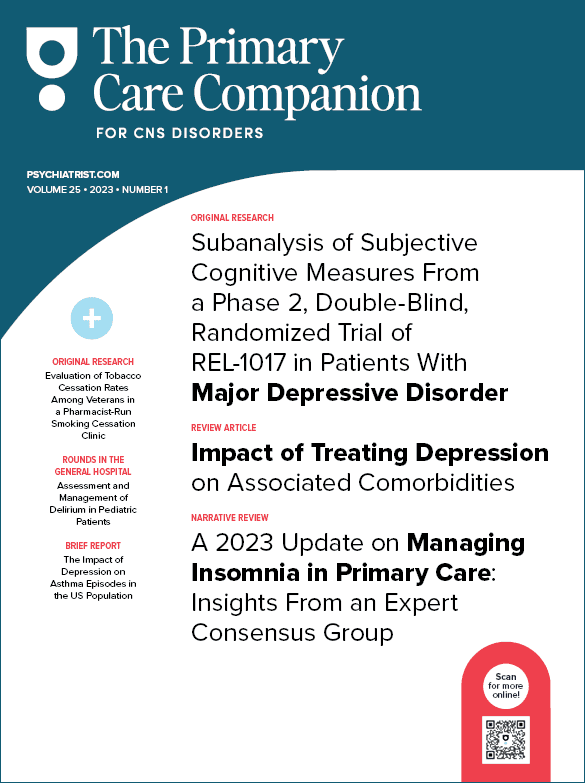
Prim Care Companion CNS Disord 2021;23(6):21cr02961
To cite: Albuquerque M, Maurício J, Cochat C, et al. Life-threatening antipsychotic-induced ileus. Prim Care Companion CNS Disord. 2021;23(6):21cr02961.
To share: https://doi.org/10.4088/PCC.21cr02961
© Copyright 2021 Physicians Postgraduate Press, Inc.
aDepartment of Mental Health, Hospital de Cascais, Cascais, Portugal
bDepartment of Psychiatry, Unidade Local de Saúde do Alto Minho, Viana do Castelo, Portugal
cDepartment of Psychiatry, Unidade Local de Saúde de Matosinhos, Matosinhos, Portugal
*Corresponding author: Margarida Albuquerque, MD, Departamento de Saúde Mental, Hospital de Cascais, Avenida Brigadeiro Victor Novais Gonçalves, 2755-009 Alcabideche, Cascais, Portugal ([email protected]).
Antipsychotic medication is the mainstay treatment for schizophrenia; however, some 30% of patients obtain little benefit from standard antipsychotic drugs. Patients who do not respond to conventional antipsychotics are considered treatment resistant. The use of clozapine in this population is associated with lower rates of psychiatric hospitalizations, index treatment discontinuation, and use of additional antipsychotics.1 Constipation due to gastrointestinal hypomotility is a common side effect of antipsychotics.2 Progression from constipation to ileus, intestinal obstruction, bowel ischemia, megacolon, and death is not rare in antipsychotic-treated patients, particularly those on clozapine.3 Combination with other antipsychotics can increase the risk of gastrointestinal hypomotility and possible life-threating events.3 Lifestyle habits, such as sedentarism, inadequate liquid intake, and low-fiber and high-fat diets may also contribute to constipation.4 Other risk factors include being male, being in the beginning of treatment (usually the first 4 months), coprescription of constipation agents, and higher daily dosage of clozapine.5 Life-threatening complications of constipation due to clozapine can occur in about 0.3% of patients.6–10
We report a case of a patient with schizophrenia who needed a life-saving total colectomy due to a paralytic ileus. Our aim is to highlight the importance of monitoring signs of constipation and of promoting a healthy lifestyle to prevent lethal outcomes.
Case Report
Mr A was a 34-year-old prisoner at Santa Cruz do Bispo’s Prisoner Establishment (north of Portugal) with a diagnosis of refractory schizophrenia (treated with clozapine 300 mg/d, haloperidol 15 mg/d, mirtazapine 30 mg/d, trazodone 150 mg/d, and risperidone long-acting 50 mg 15/15 days). No history of gastrointestinal disorders was reported. He was admitted to the emergency department of Hospital Pedro Hispano (Matosinhos, Portugal) with acute severe abdominal pain referred to his left iliac fossa in a colic pattern, nausea, vomiting, and 5 days of constipation. At clinical examination, he was apyretic and revealed a globose abdomen with pain at palpation on his left iliac fossa. Findings of blood and urine analysis revealed leukocytosis with neutrophilia. The abdominal echography was undermined by remarkable intestinal distension. He received treatment with enemas and neostigmine. After 6 hours in the emergency department, with worsening of abdominal distension and pain and no signs of gastrointestinal transit, the department of surgery decided to operate. As a consequence of advanced ischemia, it was necessary to perform a total colectomy. After the procedure, due to hemodynamic instability, he was admitted to the intensive care unit, wherein he remained for 18 days. He was discharged from the hospital after 3 months.
Discussion
This case opens up the discussion about different clinical aspects that should be considered, such as promotion of quality of care to enhance patients’ quality of life, minimize hospital admissions, and reduce morbidity and mortality rates associated with antipsychotic use and the need for available health care staff in prisons with relevant expertise to facilitate the implementation and maintenance of healthy lifestyle habits. This is a case of a patient in prison who was medicated with 3 antipsychotics and 2 antidepressants. There has been long-lasting criticism of the care of prisoners with mental health problems.11 We can hypothesize that more attention should be given to practices and interactions in these facilities to promote a more therapeutic-orientated assessment. This case underscores the need for formal monitoring of constipation and associated gastrointestinal symptoms in patients taking antipsychotics, particularly with clozapine. Treatment must be accompanied by regular physical monitoring, appropriate use of laxatives, and early intervention in constipation. Prophylaxis should include a high-fiber diet, adequate fluid intake, and physical exercise. If the patient is at increased risk for developing constipation, lower doses of clozapine combined with a second antipsychotic should be considered. Strategies used to avoid opioid-induced constipation can be helpful.12 Clinicians must be suspicious if symptoms persist or in case of physiologic derangement, particularly in those undergoing multi-antipsychotic medication.5 Patients must be educated to identify early symptoms of bowel inflammation or obstruction.5,13
Published online: November 4, 2021.
Potential conflicts of interest: None.
Funding/support: None.
Patient consent: Verbal consent was obtained from the patient to publish the case report, and information has been de-identified to protect anonymity.
References (13)

- Stroup TS, Gerhard T, Crystal S, et al. Comparative effectiveness of clozapine and standard antipsychotic treatment in adults with schizophrenia. Am J Psychiatry. 2016;173(2):166–173. PubMed CrossRef
- Shirazi A, Stubbs B, Gomez L, et al. Prevalence and predictors of clozapine-associated constipation: a systematic review and meta-analysis. Int J Mol Sci. 2016;17(6):863. PubMed CrossRef
- Nielsen J, Meyer JM. Risk factors for ileus in patients with schizophrenia. Schizophr Bull. 2012;38(3):592–598. PubMed CrossRef
- Brown S, Birtwistle J, Roe L, et al. The unhealthy lifestyle of people with schizophrenia. Psychol Med. 1999;29(3):697–701. PubMed CrossRef
- West S, Rowbotham D, Xiong G, et al. Clozapine induced gastrointestinal hypomotility, a potentially life threatening adverse event: a review of the literature. Gen Hosp Psychiatry. 2017;46:32–37. PubMed CrossRef
- Every-Palmer S, Nowitz M, Stanley J, et al. Clozapine-treated patients have marked gastrointestinal hypomotility, the probable basis of life-threatening gastrointestinal complications: a cross sectional study. EBioMedicine. 2016;5:125–134. PubMed CrossRef
- Osterman MT, Foley C, Matthias I. Clozapine-induced acute gastrointestinal necrosis: a case report. J Med Case Reports. 2017;11(1):270. PubMed CrossRef
- Every-Palmer S, Inns SJ, Grant E, et al. Effects of clozapine on the gut: cross-sectional study of delayed gastric emptying and small and large intestinal dysmotility. CNS Drugs. 2019;33(1):81–91. PubMed CrossRef
- Ingimarsson O, MacCabe JH, Haraldsson M, et al. Clozapine treatment and discontinuation in Iceland: a national longitudinal study using electronic patient records. Nord J Psychiatry. 2016;70(6):450–455. PubMed CrossRef
- Lahdelma L, Appelberg B. Clozapine-induced agranulocytosis in Finland, 1982–2007: long-term monitoring of patients is still warranted. J Clin Psychiatry. 2012;73(6):837–842. PubMed CrossRef
- Bowen RA, Rogers A, Shaw J. Medication management and practices in prison for people with mental health problems: a qualitative study. Int J Ment Health Syst. 2009;3(1):24. PubMed CrossRef
- Flanagan RJ, Ball RY. Gastrointestinal hypomotility: an under-recognized life-threatening adverse effect of clozapine. Forensic Sci Int. 2011;206(1–3):e31–e36. PubMed CrossRef
- Chen HK, Hsieh CJ. Risk of gastrointestinal hypomotility in schizophrenia and schizoaffective disorder treated with antipsychotics: a retrospective cohort study. Schizophr Res. 2018;195:237–244. PubMed CrossRef
Enjoy free PDF downloads as part of your membership!
Save
Cite
Advertisement
GAM ID: sidebar-top




